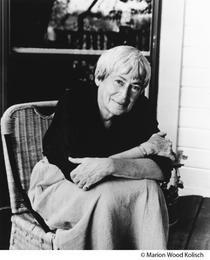 Ursula K. Le Guin, a master of modern science fiction and fantasy, died last Monday at age 88. Her many novels, short stories, children's books and poetry collections are beacons of humanity, feminist perspectives and incisive socioeconomic criticism. Le Guin was the daughter of an anthropologist, which perhaps helps explain her ability to concoct stunningly imaginative alien cultures in intimate detail. Her first novel, Rocannon's World (1966), was also the start of the Hainish Cycle, an interstellar setting in which scattered human colonies are slowly reestablishing contact after the inventions of faster-than-light travel and communication (Le Guin coined the term "ansible," a device that can communicate over any distance, which became a staple in later sci-fi work). The Left Hand of Darkness (1969) and The Dispossessed (1974), her two most famous Hainish Cycle novels, both won Hugo and Nebula awards.
Ursula K. Le Guin, a master of modern science fiction and fantasy, died last Monday at age 88. Her many novels, short stories, children's books and poetry collections are beacons of humanity, feminist perspectives and incisive socioeconomic criticism. Le Guin was the daughter of an anthropologist, which perhaps helps explain her ability to concoct stunningly imaginative alien cultures in intimate detail. Her first novel, Rocannon's World (1966), was also the start of the Hainish Cycle, an interstellar setting in which scattered human colonies are slowly reestablishing contact after the inventions of faster-than-light travel and communication (Le Guin coined the term "ansible," a device that can communicate over any distance, which became a staple in later sci-fi work). The Left Hand of Darkness (1969) and The Dispossessed (1974), her two most famous Hainish Cycle novels, both won Hugo and Nebula awards.
The five novels and several short stories of Le Guin's Earthsea fantasy series are set in a vast archipelago surrounded by uncharted oceans. A Wizard of Earthsea (1968) is considered a pioneering work of fantasy, and the Earthsea setting as a whole deliberately uses nonwhite characters to offset a genre assumption of white protagonists. Earthsea, like many of Le Guin's other stories, explores a Taoist sense of spiritual balance and a more literal importance of ecological balance. Le Guin's notable nonfiction includes the writing guide Steering the Craft (1998, updated and re-released in 2015) and her final book, No Time to Spare: Thinking About What Matters (2017). --Tobias Mutter

